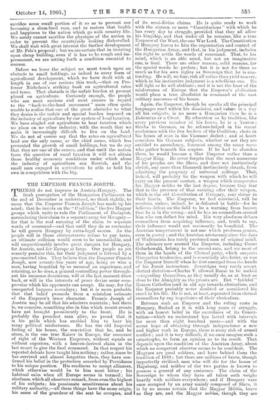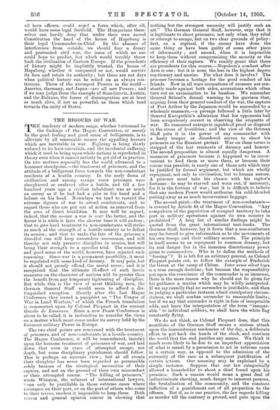T HINGS do not improve in Austria-Hungary. The fresh prorogation of
the Hungarian Parliament to the end of December is understood, we think rightly, to mean that the Emperor Francis Joseph has made up his mind ; that he insists on the "Coalition," the five Magyar groups which unite to rule the Parliament of Budapest, surrendering their claim to a separate army for Hungary— for that is the real meaning of the claim to separate words of command—and that until they do so surrender he will govern Hungary by extra-legal means. As the people will in those circumstances refuse to pay taxes, an ultimate collision would seem to be unavoidable, and will unquestionably involve great dangers for Hungary, for Austria, and for Europe at large. Our people as yet scarcely perceive this, for their judgment is fettered by a preconceived idea. They believe that the Emperor Francis Joseph, now seventy-five years of age, being so wise a man, having benefited by so unusual an experience, and retaining, as he does, a general controlling power through- out his immense dominions, will at the last moment draw back, or will in the interests of peace devise some com- promise which his opponents can accept. He may, for the unexpected happens nowadays ; but it is more probable that that belief proceeds from a mistaken estimate of the Emperor's inner character. Francis Joseph of Austria may be all that his admirers maintain ; but there is, we conceive, something else in him which recent events have not brought prominently to the front. He is probably the proudest man alive, so proud that it is his pride which has enabled him to bear his many political misfortunes. He has the old Imperial feeling of his house, the conviction that he, and he alone, is the one true Kaiser in Europe, the successor of right of the Western Emperors, without equals as without superiors, with a heaven-derived claim in the last resort to give the final command. In that respect his repeated defeats have taught him nothing; rather, since he has survived and almost forgotten them, they have con- firmed his belief in the protection accorded by Providence to his unique position. His readiness to accept alliances, which otherwise would be to him most bitter ; his habitual calm when all Europe seems in turmoil ; his aloofness, which all observers remark, from even the highest of his subjects ; his passionate sensitiveness about his military authority,—all these things have the same origin, his sense of the grandeur of the seat he occupies, and
of its semi-divine claims. He is quits ready to work with the sixteen or more " Constitutions " with which he has every day to struggle, provided that they all allow his kingship, and that under all he remains, like a true Emperor of the West, the one War Lord. The Constitution of Hungary leaves to him the organisation and control of the Hungarian Army, and that, in his judgment, includes: the right to settle the words of command. That, to his mind, which is an able mind, but not an imaginative one, is final. There are other reasons, solid reasons, for the special words he prefers ; but it is not for them so much as for his own rights as Sovereign that he is con- tending. He will, we fear, risk all rather than yield to a cry, which in his instinctive judgment is a rebellious one. He will fight or he will abdicate ; and it is not the least of the misfortunes of Europe that the Emperor's abdication would place a true absolutist in command of the vast military resources of his house.
Again, the Emperor, though he speaks all the principal' languages used within his dominion, and values in a way all his subjects, is no more a Hungarian than he is a Bohemian or a Croat. By.alucation as by tradition, like every previous member of his house, he is a Teuton; thinks in German, as he acknowledged in his recent conference with the five leaders of the Coalition; chats in his hours of ease in the Viennese dialect ; and at heart considers his German subjects, whether or not they are entitled to ascendency, foremost among the many races who gather beneath his sceptre. If he had to abandon them, he would become a Slav Emperor rather than a Magyar King. He never forgets that the most numerous of his peoples are the Slays, and does not instinctively shriuls, any more than Bismarck instinctively shrank, from admitting the propriety of universal suffrage. That, indeed, will probably be the weapon with which he will carry on the present contest, a weapon which exasperates his Magyar nobles to the last degree, because they fear that in the presence of that enticing offer their weapon, which is the old Constitution of Hungary, may shiver in their hands. The Emperor, we feel convinced, will be resolute, unless, indeed, he is defeated in battle—for he believes defeat on the field to be a warning from heaven that he is in the wrong—and he has no counsellors around him who can deflect his mind. His very aloofness debars counsellors from acquiring influence, and, truth to say, their influence would not necessarily be beneficial. The Austrian temperament is not one which produces genius, even in poetry ; and the Austrian aristocracy since the days of Wallenstein has rarely produced men of original mind. The advisers now around the Emperor, including Count Goluchowski, belong to the second-rate, and are most of them in the hands of the Clerical party, which suspects Hungarian tendencies, and is essentially absolutist, as was the Emperor himself when he first emerged front the hands of his Jesuit instructors. Sovereigns very rarely accept clerical dictation—Charles V. allowed Rome to be sacked —regarding themselves, as they usually do, as at least as close to the Almighty as the priests are. But " faithful " Roman Catholics tend in old age towards clericalism, and the Emperor probably never doubted or considered his creed in his life. He is not, at least, separated from clerical counsellors by any impatience of their clericalism.
Between such an Emperor and the ruling caste in Hungary, flushed as it is with long years of struggle, with an honest belief in the sacredness of its Consti- tution—which we understand has lasted with intervals for more than eight hundred years—and with the secret hope of obtaining through independence a new and higher rank in Europe, there is every risk of armed conflict ; and it is very difficult, if we once imagine such a catastrophe, to form an opinion as to its result. That depends upon the condition of the Austrian Army, about which no competent observer seems to be confident. The Magyars are good soldiers, and have behind them the tradition of 1848; but there are millions of brave, though imperfectly civilised, men who will die for the house of Hapsburg, and neither of the two parties is known to possess a general of any eminence. The claim of the Sovereign to whom they have all taken oath weighs heavily with soldiers everywhere ; and if Hungary were once occupied by an army mainly composed of Slays, it is by. no means certain that the Magyar Militia, brave as they are, and the Magyar nobles, though they are
all born officers, could expel a force which, after all, would have some legal foothold. The Hungarians them- selves can hardly deny that under their own sacred Constitution the head of the house of Hapsburg is their legal Commander-in-Chief. In the absence of interference from outside, we should fear a dreary and protracted civil war, the issue of which no one could hope to predict, but which would terribly throw back the civilisation of Eastern Europe. If the precedents of history might be implicitly trusted, the house of Hapsburg, whether it conquered or not, would survive its foes and retain its authority ; but these are not days when political history can be relied on as always con- tinuous. Three of the strongest Powers in the world— America, Germany, and Japan—are all new Powers ; and if we may judge from the example of Scandinavia, Austria, and the Balkans, the forces of disintegration are at least as much alive, if not as powerful, as those which tend towards the unity of States.















































 Previous page
Previous page